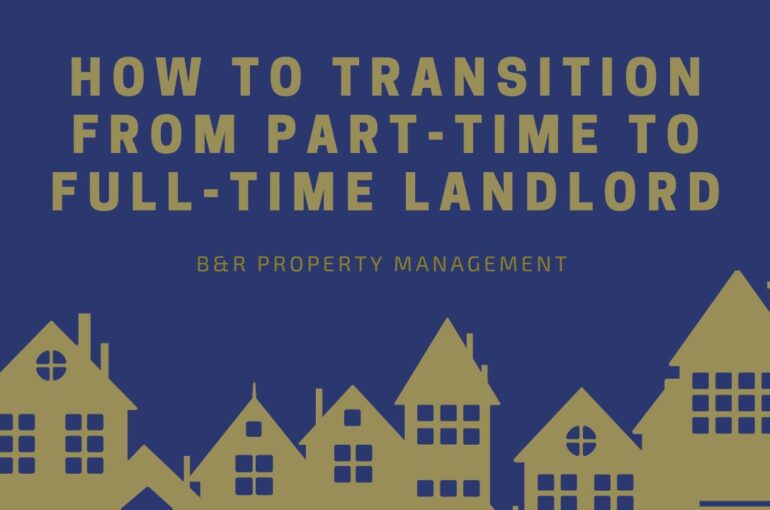How to Transition from Part-Time to Full-Time Landlord
How to Transition from Part-Time to Full-Time Landlord

Transitioning from a part-time landlord to a full-time one is a significant leap that requires careful planning and consideration. Whether you’ve been managing a few rental properties on the side or are looking to turn your real estate game into a full-fledged business, this transition demands strategic steps to ensure a smooth and successful shift.
Continue reading to learn the key aspects of making this transition a success!
Build a Financial Cushion
Building a strong financial cushion is a crucial step in the transition from part-time to full-time landlord. This cushion serves as a protective buffer against unforeseen expenses, market fluctuations, and periods of vacancy. Here is how you can do it:
- Start by assessing your current financial situation, taking stock of both assets and liabilities associated with your properties.
- Consider setting aside a portion of your rental income specifically for this cushion, ensuring a steady accumulation over time. Establishing an emergency fund equivalent to several months’ worth of expenses can provide peace of mind and financial stability.
- Explore financing options for potential property acquisitions and maintain a contingency fund to cover unexpected repairs or maintenance.
A well-constructed financial cushion not only safeguards your business against uncertainties but also provides the flexibility needed for strategic investments and growth opportunities.
Consider Hiring a Property Manager

Employing the services of a property manager is a strategic move that can greatly enhance the efficiency and effectiveness of your transition from a part-time to a full-time landlord. A property manager takes on the day-to-day responsibilities of overseeing your rental properties, allowing you to focus on strategic decision-making and scaling your portfolio.
When evaluating potential property managers, look for individuals or firms with a proven track record, excellent communication skills, and a deep understanding of local real estate regulations.
Delegating tasks such as tenant communication, property maintenance, and rent collection to a property manager not only frees up your time but also brings professional expertise to the table.
This can result in improved tenant satisfaction, reduced vacancy rates, and streamlined operations. While there is a cost associated with hiring a property manager, the benefits often outweigh the expenses, offering you the opportunity to grow your real estate business with greater peace of mind and efficiency.
Establish Relationships with Contractors
Try to find reputable contractors in your local area who specialize in key areas such as plumbing, electrical work, HVAC, and general maintenance. Seek recommendations from other landlords, check online reviews, and verify their credentials.
Establishing a reliable network of contractors who can promptly respond to issues is essential for maintaining the value and functionality of your properties.
When reaching out to potential contractors, communicate clearly about your expectations, the scope of work, and your commitment to a long-term partnership. This transparency fosters trust and helps in avoiding misunderstandings down the line.

Develop Clear Communication Channels with Tenants
Initiating clear and open communication starts with setting expectations from the very beginning. In your welcome package or during the lease signing, provide tenants with a comprehensive guide outlining the preferred communication methods, emergency contacts, and the expected response time for non-emergency queries.
Encourage tenants to report maintenance issues through a designated online portal, email, or a dedicated phone line. This not only centralizes communication but also provides a documented record of requests, aiding in efficient issue resolution.
Additionally, consider implementing a regular check-in system where you proactively seek feedback on the living conditions and address any concerns before they escalate.
Regularly scheduled communication goes a long way. Consider sending monthly newsletters or updates to keep tenants informed about community events, maintenance schedules, or any upcoming changes.
Analyze Market Trends and Demands
Analyzing market trends and demands involves a thorough examination of the real estate market to identify patterns, shifts, and the evolving needs of potential tenants. By staying attuned to market dynamics, you can make informed advertising and managing decisions that contribute to the success of your property investment journey.
Understand the demand for rental properties in different neighborhoods and assess factors such as population growth, employment rates, and economic development. Identify areas that show promise for future growth and increasing rental demand.

Furthermore, consider the preferences and expectations of your target tenant demographic. Market trends are not only influenced by economic factors but also by shifts in lifestyle and societal preferences.
For example, there might be an increasing demand for sustainable or smart homes or a preference for certain amenities such as co-working spaces or fitness facilities.
This proactive approach positions you to make well-informed decisions as you transition into a full-time landlord, ensuring the long-term success of your real estate endeavors.
Get in Touch with Other Landlords
Getting in touch with other landlords can be a valuable step in your journey to becoming a full-time landlord. Networking within the real estate community provides opportunities to share experiences, gain insights, and stay informed about industry trends.
Attending local real estate events, seminars, or networking meet-ups. These gatherings are excellent platforms to meet fellow landlords, property managers, and real estate professionals. Engage in conversations, exchange contact information, and express your willingness to connect for mutual support and knowledge sharing.
By actively seeking and nurturing these connections, you’ll find yourself better equipped to handle the challenges of being a full-time landlord, armed with a community of support and a wealth of collective knowledge.
Wrapping It Up
The transition from part-time to full-time landlord is a tricky journey that demands careful planning, strategic decision-making, and a commitment to continuous learning.
Whether you’re expanding an existing portfolio or venturing into new territory, the comprehensive approach outlined in this guide provides a roadmap for a seamless and successful transition to full-time landlord.
If you want to make your transition to full-time landlord smoother and more successful, consider partnering with B&R Property Management. Our experienced team is here to provide comprehensive property management services, from tenant relations to financial management. Contact us today to learn more about our services!



